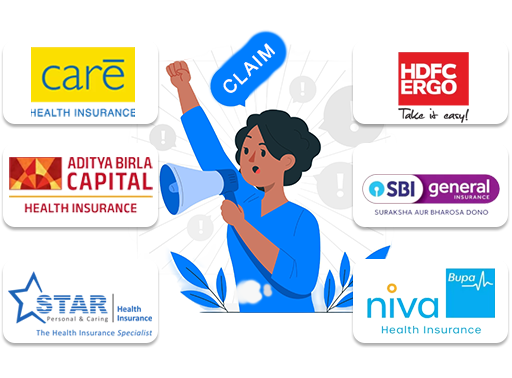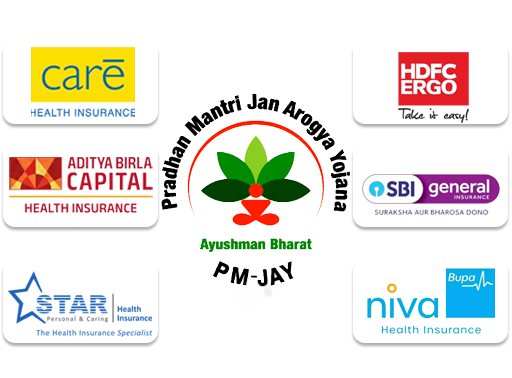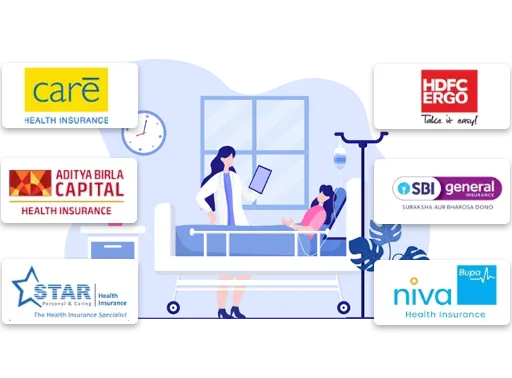Health Insurance Tax Benefits




Simran is an insurance expert with more than 4 years of experience in the industry. An expert with previous experience in BFSI, Ed-tech, and insurance, she proactively helps her readers stay on par with all the latest Insurance industry developments.
Reviewed By:

Anchita has over 6 years of experience in content marketing, insurance, and healthcare sectors. Her motto to make health and term insurance simple for our readers has proven to make insurance lingos simple and easy to understand by our readers.
Updated on Jul 14, 2025 4 min read
Health Insurance For Tax Savings
One of the long-standing demands from Budget 2025-26 was the increase in health insurance Tax deductions under section 80D. The current limits are INR 25,000 and 50,000 for general citizens and senior citizens respectively. Despite speculations, there were no amendments announced in the Budget for FY 2025-26.
Regardless of the increase in tax deduction limits, certain changes in the tax regime are seen as a boost to increase insurance penetration in India. The insurance sector would now accept 100% of FDI (Foreign Direct Investments), up from the previous 74%.
In this article, we will uncover the different health insurance tax exclusions, their benefits, and how you can take the right advantage of them. Before we move on, let us understand health insurance first.
 traordinary Facts
traordinary Facts
Section 80D of the Income Tax Act, of 1961 has not seen any change in tax deduction limits in a long time. Tax deduction limits were increased from INR 15,000 to 25,000 for general citizens in 2015. While, for senior citizens, the tax deduction limits were increased from INR 30,000 to INR 50,000 in 2018.
What Is Health Insurance?
Most Indians do not believe in preventive medical care. However, witnessing a global pandemic has changed how health insurance is perceived.
Investing in health insurance plans will offer you a financial safety net against hefty medical bills. You and your family are covered for daycare treatments, maternity expenses, and alternative treatments.
Available as individual, family, and group health insurance plans come with tax deductions.
For more information read more on What is Health insurance?
New Income Tax Slabs
The budget presented by Finance Minister Nirmala Sitaraman for FY 2025-26, has also introduced new income tax slabs that are as follows
| Income (INR) | Tax Slabs |
| 0 to 4 Lakhs | Nil |
| 4 to 8 Lakhs | 5% |
| 8 to 12 Lakhs | 10% |
| 12 to 16 Lakhs | 15% |
| 16 to 20 Lakhs | 20% |
| 20 to 24 Lakhs | 25% |
| Above 24 Lakhs | 30% |
Under the new tax regime, individuals earning up to ₹12 lakh annually will not have to pay any income tax. The aim is to reduce the tax burden from the different income sections of society, especially the financially-burdened middle class.
Additionally, more changes are seen like
- The government will present the new Income Tax Bill
- Tax Deduction at source will be rationalized for easy compliance
- Tax deductions Limits for senior citizens doubled to INR 1 Lakh
Introduction To Section 80D
The government of India established section 80D of the Income Tax Act.
Every individual and family (Hindu united family) is eligible to claim tax deductions for 2 kinds of premium payments
- For self and family
- For dependent parents
Health insurance tax benefit section 80D applies to all kinds of health plans including top-ups and critical illness. Moreover, Non-resident Indians (NRIs) can also claim tax deductions under section 80D for health plans purchased in India.
Tax Benefits On Health Insurance Eligibility
Indian Nationals and NRIs (Non-Residential Indians) along with Hindu Undivided families (HUFs) are eligible for tax benefits on health insurance under section 80D of the Income Tax Act, 1961.
Tax Deductions Under Section 80D
You can claim the following tax deductions under Section 80D as per the Income Tax Act, of 1961.
| Tax Deduction | Applicable On Health Insurance |
| Up to INR 25,000 | For self, spouse, dependent children, or parents |
| Up to INR 50,000 | For parents (60 years and above) |
| Up to INR 5,000 | For preventive health check-ups for self, spouse, dependent children, and parents. |
| INR 25,000 | For NRIs (Non-Resident Indians) |
Tax Benefits On Health Insurance Premium
Let us further understand these tax deductions with examples:
Example 1
Mr. Nitin invests in a family floater health insurance plan. The family floater covers Mr. Nitin, his spouse, and 1 dependent child (all below 60 years of age). The annual policy premium paid is INR 18,000.
Furthermore, Mr. Nitin invests in a senior citizen health insurance plan (both parents above 60 years of age) for which he pays an annual premium of INR 14,000.
As per the table mentioned above, Mr. Nitin is eligible for a claim of up to INR 75,000 under section 80D including INR 25,000 for the family floater health plan and INR 50,000 for the senior citizen health plan.
This shows that the total premium amount of INR 32,000 paid by him for both health plans is well under tax deduction limits and will be refunded at the end of every financial year till the policies are active.

Family Floater Plan
INR 18,000
+

Senior Citizen Plan
INR 14,000
=
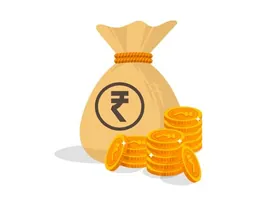
Total premium
INR 32,000
Example 2
Tax deductions under section 80D including preventive health check-ups.
Mr. Ashok has a family of 6 members
- Mr. Ashok (35 Years)
- His Wife (32 Years)
- 2 Dependent kids (11 and 7 Years)
- Father (65 Years)
- Mother (63 Years)
- Mr. Ashok purchases a family floater plan that covers him, his wife, and 2 dependent children for which he pays an annual premium of INR 30,000. He also pays an additional INR 15,000 for his preventive health check-ups
Cover Actual Expenses Tax Deductions Under Section 80D Total Deduction Applied Premium paid for self, spouse, and children INR 30,000 INR 25,000 INR 25,000 Amount paid for preventive health check-ups for self, spouse, and children INR 15,000 INR 5,000 INR 5,000 Total Expenses for Family Floater Health Plan INR 45,000 INR 25,000 INR 25,000 - Furthermore, Mr. Ashok pays an annual premium of INR 52,000 for senior citizen health insurance for his parents. He also pays an additional INR 10,000 for his parent’s preventive medical check-ups respectively. Let us understand all the tax deductions for Mr. Ashok through the table mentioned below
Cover Actual Expenses Tax Deductions Under Section 80D Total Deduction Applied Premium paid for senior citizens’ health plan INR 52,000 INR 50,000 INR 50,000 Preventive Health check-ups for parents INR 10,000 INR 5,000 INR 5,000 Total Expense for Senior Citizens Health Plan INR 62,000 INR 50,000 INR 50,000 - The total tax exemptions that Mr. Ashok can avail of with both family floater and senior citizen health insurance in a financial year is INR 75,000.
Tax Deductions In Health Insurance Acceptable Mode Of Payment
Health insurance is truly cashless when it comes to tax deductions. You can claim tax deductions according to section 80D on health insurance premiums paid via all online methods such as UPI, Debit and Credit Cards, bank drafts, cheques, etc. However, health insurance premiums paid in cash are not eligible for tax deductions.
In the case of preventive health check-ups, you are eligible to claim tax deductions through cash as well as digital payments.
Health Insurance Tax Benefits Other Than Section 80D
This may come as a surprise but there are other lesser-known tax deductions applicable on health insurance plans.
We have discussed the same in the section below
Under Section 80 DD
Under Section 80 DD, the annual limit for tax deductions on taking care of a dependent family member with a disability of more than 80% is INR 1.5 Lakhs. Dependents include
- Parents
- Spouse
- Dependent Children
- Sibling, or any other family member.
When filing income tax returns, make sure to submit a medical disability certificate which is issued by the state or central government medical board to claim tax benefits on health insurance.
Under Section 80DDB
Applicable for individuals and HUFs for availing treatment for a specific illness listed below
- Specific neurological ailments wherein the disability is determined to be 40% and above
- Malignant cancers diagnosed and certified by an oncologist
- AIDS
- Chronic Renal Failure
- Haemophilia
- Thalassaemia
Tax deduction limits under section 80DDB
- Up to INR 40,000 for below 60 years
- Up to INR 1 L for 60 years but below 80 years of age
- Up to INR 1 L for 80 years and above
Tax Deductions on Long-Term Health Insurance Plans
’I have purchased a 2-year health insurance plan, am I eligible for tax benefits?’ asks a curious customer to our PolicyX insurance expert.
Much to her surprise, we tell her how their health plan with a policy term of 2 years is eligible for tax deductions as per section 80D.
Your health insurer will issue a certificate claiming the amount of premium paid by you so you can avail of proportionate tax deductions under section 80D.
Factors To Keep In Mind To Get The Best Out Of Health Insurance Tax Benefits
Consider these factors before you claim health insurance tax benefits:
- Make sure to pay health insurance premiums online via UPI, Credit/Debit Card, Bank Draft, Cheque, etc.
- If you have a family floater health plan and a senior citizen health insurance for your parents separately you can claim tax benefits for both respectively.
- If you do not have the receipt for health insurance premium payment you are not eligible to claim tax deductions
- If you do not have a disability certificate from the state or central government medical board you are not eligible to claim tax deductions under section 80DD.
- You are not eligible to claim tax deductions for health insurance coverage provided to you by your employer.
Final Verdict
If you are under the misconception that health plans are mere protection plans for you and your family against medical bills, you may be mistaken. The multiple tax benefits in health insurance plans are encouragement enough for you to invest in the best health plans.
To understand how sections 80D, 80DD, and 80DDB are your financial saviours, refer to the article above. For any further clarification contact us at 1800-4200-269.
Consult for Personalized Insurance Advice

But how does it work?
Schedule a call with India’s number 1 trusted advisor with a 4.5+ rating on Google. We are not your average insurance agents. Our advisors are experts in their insurance knowledge and will give you the right information at the right time. The service is free of cost! Don’t worry, we won’t spam as we value your time.
Health Insurer Network Hospitals
Health Insurance Tax Benefits: FAQs
1. What are the tax benefits of health insurance?
Individuals and Hindu United Families (HUFs) are eligible for tax benefits under section 80D of the Income Tax Act, of 1961.
2. What are the tax deduction limits as per budget for FY 2025-26 under section 80D, of the Income Tax Act, 1961?
As per the latest budget of FY 2025-26, the tax deduction limits under the Income Tax Act, 1961 are up to INR 50,000 for senior citizens, and up to INR 25,000 for general citizens.
3. How much tax exemption can I avail on preventive health check-ups?
Preventive health check-ups are eligible for up to INR 5,000 tax deductions under section 80D of the Income Tax Act.
4. What is section 80DD?
Under section 80DD the annual limit for tax deductions on taking care of a dependent family member with a disability of more than 80% is INR 1.5 Lakhs. Make sure to issue a medical disability certificate to showcase when filing for annual tax returns.
5. What are the latest announcements for the Insurance Tax regime in the budget of FY 2025-26?
The biggest move made by Finance Minister Nirmala Sitharaman was to eliminate the FDI capping opening up the opportunity for increased foreign investment, enhanced competition, and an increase in insurance penetration, especially in suburban and rural areas.
6. Is there any increase in tax deduction limits in the budget for FY 2025-26?
No, there were no new announcements for tax deduction limits for the FY 2025-26 budget.
Health Insurance Companies
Know More About Health Insurance Companies
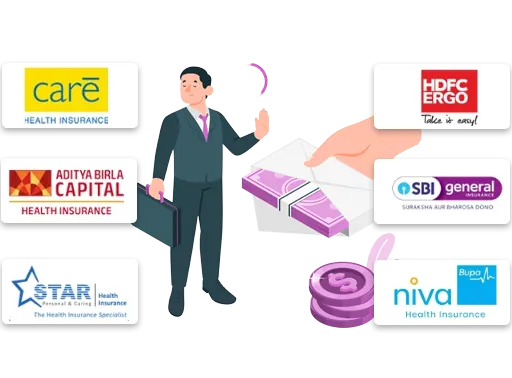



2864-1724827757.webp)
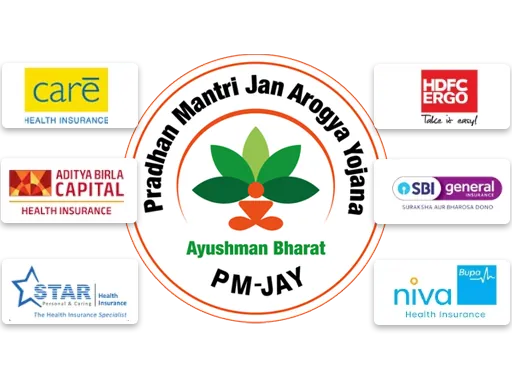

2212-1724829843.webp)

